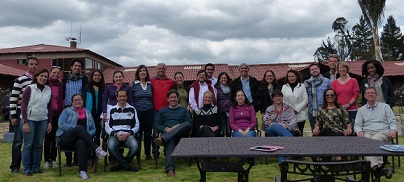How to enthrall and how to drive change
How to enthrall and how to drive change
Claudia Martinez, CDKN’s Senior Strategy Advisor in Colombia and Pippa Heylings, CDKN’s Lead for Climate Compatible Development Policy and Practice, report back on CDKN’s Knowledge Lab in Colombia this week. The lab was organised to innovate new ideas for communicating climate change and galvanising public action.
When Rodrigo Suarez, the Director of Climate Change of Colombia was asked to tell the audience of the Knowledge Lab about the schoolteacher who inspired him the most, he remarkably spoke about his maths teacher in fifth year of elementary school, who inspired a love of numbers in him by transmitting knowledge in an inspiring way and helping him to believe in himself.
Inspiration, knowledge sharing and trust was precisely what came out of the Knowledge Lab in Casa de Paz, Colombia, where 40 CDKN stakeholders and partners from different institutions and regions of Colombia, and some special guests from Peru, gathered to share experiences. The goal was to explore how to be more effective in sharing and transmitting knowledge on climate change in a more compelling way to others.
Claudia Martinez welcomed participants by explaining that the Knowledge Lab was yet another opportunity for partners to move beyond conventional meetings and work in a ‘CDKN way’. She invited them to a space where they were free to feel, share, connect with what motivates them most and so inspire new, crazy ideas on how to acquire and communicate climate change issues and solutions. Pippa Heylings painted a picture of CDKN’s project work in Ahmedabad, India where 46.8oC temperatures led to high levels of mortality and suffering and provided the tipping point for coordinated policy and action. Here, government agencies, organisations and local people have moved from perceiving heatwaves as something “normal” to recognising heatwaves as a ‘mortal threat’. They have changed their workplace norms, the location of emergency services and inter-agency coordination and have built the first early warning system for heat health in South Asia.
At a ‘knowledge fair’, participants shared what they are doing in climate change in their own institutions in Colombia and Peru. Institutions were invited to give 3-minute ‘elevator pitches’ about their programmes including the IADB, Bank Findeter, the Ministry of Transport, EPM - one of the biggest energy service companies in Colombia - UNDP, WWF, ONF Andina, Econometria, CIAT, Association of environmental regional corporations, the National Planning Department, the Dutch Embassy and others.
During the Knowledge Lab, participants were invited to explore through music, creative thinking and group work, the meanings of information, knowledge and wisdom, and then discuss the types of knowledge necessary to change attitudes and make climate change a priority in Colombia for decision makers in different fields and citizens in general.
Inspirational talks were added to the mix and the participants recognised that transformational change does not come about through policies, plans and the dissemination of rational information alone; leaders and movements gain traction by also connecting with emotions, passion and the inner motivations in each of us. However, once they came to undertaking group work activities to identify ways to move towards a vision of a climate compatible Colombia, participants found themselves falling prey to conventional ways of disseminating information and the creation of norms, rules and institutions. It’s hard getting this emotive stuff right and creating compelling narrative that enthralls and changes paradigms.
Nevertheless, by the end of the Knowledge Lab, change was in the air. For example, having found common issues about which they were passionate, one group of participants including Pedro Solano, Director of SPDA and Carolina Elia from Porticus Foundation gracefully presented the ‘Magical Resilience’ initiative: an initiative which celebrates the joyful and ebullient Colombian spirit that has endured so much in terms of conflict and climate impacts – and promotes ways to build on that identity to promote even greater resilience. A group of those who currently work separately on planning at the regional level were inspired by the international system of twinning between countries and cities – and launched the idea of Twinning Regions on Climate Change to help share and scale up actions towards climate compatible development.
Connie Espinosa, CDKN Regional Director for Latin America and the Caribbean provided closing words, celebrating the innovative approach to knowledge management taken during the event – and remarking that participants could build on this spirit around Latin America and the world.
Picture: Participants in the CDKN Colombia Knowledge Lab by Pippa Heylings. Francisco Arias, partner in CDKN’s Cartagena adaptation project and Director of INVEMAR, reminded participants that Colombia is 50% Ocean. Pedro Nel Medina, the climate change coordinator of the Autonomous regional corporation of Antioquia presented the award-winning Banco2 impact investment initiative and the importance of regional climate change plans. Lupe Guinand of Libelula presented the CDKN supported PlanCC process of Peru.

